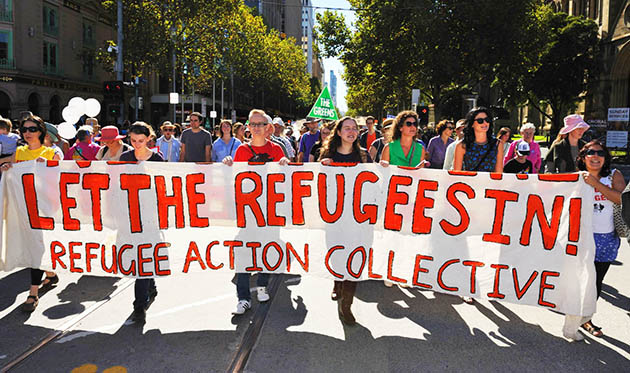Offshore processing is in crisis, with the Manus Island detention centre likely to close and Nauru in meltdown as refugees despair after almost three years on the island.
Both major parties remain firmly committed to the deterrence of refugees coming here. But there is an alternative.
Jonathan Holmes, former presenter of Media Watch, took to The Age’s opinion page in early May to chide critics of offshore processing for lacking any “vaguely practical alternative”. Unless we stop the boats, “there are hundreds of thousands, possibly millions, more where they came from”, he claimed.
It’s nonsense. Most asylum seekers from Africa and the Middle East are hosted by poor countries, or headed for Europe—not Australia. The highest ever number to arrive by boat in one year was just 20,587 in 2013. This number is equal to just 7 per cent of the 203,750 permanent migrants Australia is accepting this year. The mainstream parties are proposing to lift the annual refugee intake close to this number, with the Liberals committed to an increase to 18,750 and Labor to 27,000. The Greens have suggested 50,000.
The number of refugees seeking freedom is not primarily dictated by how “tough” border security policies are, but goes up and down in response to the conflicts and persecution that drive people to flee.
Malcolm Turnbull’s claim that concern about the horrors on Manus Island and Nauru is just a case of “misty eyes” has no credibility. The anti-refugee policies of Liberal and Labor are driven by political opportunism and an effort to cultivate a scapegoat and boost xenophobia.
Alternatives
Refugees should be welcome however they arrive here, whether by boat, plane or through the government-sponsored program from refugee camps offshore. Asylum seekers travel by boat because there is no alternative.
If Australia was genuinely concerned about making the journey between Australia and Indonesia less dangerous, it could process refugee claims in Indonesia and flying recognised refugees here. This idea is widely supported in the refugee movement.
But some asylum seekers will still have no choice but to come directly by boat. In May another boat arrived at the Cocos Islands directly from Sri Lanka, as others have previously. Responsive search and rescue services, instead of the inadequate efforts of recent years, could ensure boats were rescued.
No detention
All refugee detention centres should be closed completely—both Manus and Nauru as well as Christmas Island and all the mainland detention centres. Asylum seekers could be housed in open migrant hostels while their refugee claims were processed.
This is exactly what Australia did until 1992. Refugee arrivals from Vietnam in the 1970s and from Europe after the Second World War were not detained.
The Greens have committed to closing Manus Island and Nauru, but still accept that detention for a maximum of 30 days may be necessary.
But detention is not necessary for medical checks, security screening or any other reason. Millions of tourists visit Australia every year without the need for any period of mandatory detention to work out if they might be a security risk.
People’s refugee claims should be processed quickly, so that they are not living in limbo for years on end. At present there are 28,000 asylum seekers in Australia who have been waiting in some cases for almost four years for their claims to be assessed.
The refugee processing system is driven by the cruel logic of deterrence. Asylum seekers are being continually sent back to danger by a system designed to reject as many people as possible. Five ethnic Hazaras have been deported to Afghanistan in the last year, the last of them despite his two brothers being killed since he left the country.
Those found to be refugees must be given permanent residency with full rights to work and live wherever they wish, along with settlement support. Temporary Protection Visas, which leave refugees in ongoing uncertainty, must be scrapped.
Over the last year public opinion has started shifting towards greater support for refugees. Arguing to support refugees because they are good for the economy, or can be selected on the basis of having certain skills, is the wrong approach. Refugees should be brought here on the basis of the greatest need, recognising that some of them may not have trade or English skills. That is why The Greens’ policy of including 10,000 “Skilled refugee” visas in their proposed intake is problematic.
Refugees are not a threat to jobs or services. Nor has any refugee arriving by boat ever been involved in terrorism in Australia. If the movement is to win majority support, we have to tackle the myths and xenophobia underlying hostility to refugees head on.
By James Supple






